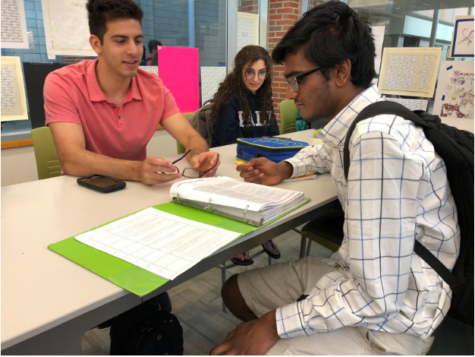This week, students nationwide are taking hours of exams in hopes of testing their knowledge and gaining college credit. The College Board’s Advanced Placement (AP) Exams are popular among students, with over 1.17 million U.S. public high school students in 2017 taking a total of 3.98 million AP Exams, and rightfully so. Not only do AP Exams offer academic rigor not typically found in high school courses, but they can also provide college credit and help reduce the cost of secondary education. In Indiana, all public colleges and universities must issue credit to students who score a 3 or higher—the equivalent of passing the exam—and with the highest price tag being $142, AP Exams are much cheaper than taking courses at a college or university.
With 34 AP courses offered, CHS is the perfect environment for students to take advantage of AP Exams and their benefits. However, not all students chose to take AP courses, opting instead to go straight to the exam instead. One such student is senior Amit Kannan, who has self-studied for the AP Psychology, Microeconomics, Environmental Science, Art History, and Literature exams.
“I don’t consider self-studying studying because I’ve never really studied for an AP exam,” Kannan said. “It’s more implementing your interests in a framework that’s conducive to knowledge. So basically you’re just rearranging your current experiences into a more test-oriented pathway.”
Kannan said that his prior knowledge of certain subjects were his primary reasons for self-studying for tests, though the college credit is an added bonus. For students who choose to self-study for AP Exams, Kannan recommends following a similar approach and focusing on exams that students already know and have an interest in.
“(By choosing tests you already have an interest in), you already will know most of the content, or if you’re really interested, it shouldn’t be very hard to learn it all yourself, and then you just have to cover the few areas you don’t know yourself that are going to be on the AP test,” Kannan said.
Counselor Stephanie Payne said she agrees with Kannan. Payne said students are welcome to take any AP Exam they would like to register for, but it would be in their best interest to choose exams that they are motivated to succeed in.
“Self-studying is certainly an option and I think that’s going to be primarily up to each individual student’s choice,” Payne said. “Obviously for some students self-studying gives them additional opportunities to earn some college credits when maybe you already have a full schedule and don’t have room to take those classes.”

However, a major component of AP Exams is the coursework and the experience of taking the class. Students who self-study for exams miss out on opportunities to connect with staff and other students on subjects of interest, which may potentially lead to a less enjoyable learning experience.
Senior Nikhil Raghuraman cites his experience in his AP Calculus BC classroom as one of the primary reasons for his success on the AP Exam. Raghuraman was one of three students in the world who scored a perfect score on the exam last year, and although Raghuraman already had an interest in the subject, it was the class that helped him the most when achieving that score.
“I had always been super excited to get to Calculus and when I finally did it was even better than I expected, so it just super fascinated me,” Raghuraman said. “(Self-studying) just probably wouldn’t be as enjoyable as going through it with a class and having the normal experience of taking notes with the teacher.”
A major benefit of taking AP courses is the teacher-student connection, Raghuraman said. Teachers are trained in not only the content of the exam, but also the exam itself. Furthermore, many teachers have accumulated years of experience and adapted to the evolution of each test, and this knowledge isn’t always available in the prep books that self-studying students commonly use.
“I’ve never been a huge fan of review books, because I feel that they’re not as effective as what your teachers have given you, and most of our teachers have lots of experience teaching these AP classes so they know what’s on the exam and what’s important and they know how to teach it, and in my opinion, they can present it much better than these review books can,” Raghuraman said. “The review books can just be touching up on certain concepts, but I don’t recommend just solely using the review book.”
Kannan said he agrees with Raghuraman on the benefits of a classroom environment, but acknowledges that not all students may benefit from such an atmosphere the same way.
“I think that the classroom experience is definitely very beneficial for students who like that extra component of discussion,” Kannan said, “but if you already know a certain amount of classroom material or are already thorough in the fundamentals of a certain concept or study, then you really can manage everything by yourself.”































![What happened to theater etiquette? [opinion]](https://hilite.org/wp-content/uploads/2025/04/Entertainment-Perspective-Cover-1200x471.jpg)














































![Review: “The Immortal Soul Salvage Yard:” A criminally underrated poetry collection [MUSE]](https://hilite.org/wp-content/uploads/2025/03/71cju6TvqmL._AC_UF10001000_QL80_.jpg)
![Review: "Dog Man" is Unapologetically Chaotic [MUSE]](https://hilite.org/wp-content/uploads/2025/03/dogman-1200x700.jpg)
![Review: "Ne Zha 2": The WeChat family reunion I didn’t know I needed [MUSE]](https://hilite.org/wp-content/uploads/2025/03/unnamed-4.png)
![Review in Print: Maripaz Villar brings a delightfully unique style to the world of WEBTOON [MUSE]](https://hilite.org/wp-content/uploads/2023/12/maripazcover-1200x960.jpg)
![Review: “The Sword of Kaigen” is a masterpiece [MUSE]](https://hilite.org/wp-content/uploads/2023/11/Screenshot-2023-11-26-201051.png)
![Review: Gateron Oil Kings, great linear switches, okay price [MUSE]](https://hilite.org/wp-content/uploads/2023/11/Screenshot-2023-11-26-200553.png)
![Review: “A Haunting in Venice” is a significant improvement from other Agatha Christie adaptations [MUSE]](https://hilite.org/wp-content/uploads/2023/11/e7ee2938a6d422669771bce6d8088521.jpg)
![Review: A Thanksgiving story from elementary school, still just as interesting [MUSE]](https://hilite.org/wp-content/uploads/2023/11/Screenshot-2023-11-26-195514-987x1200.png)
![Review: "When I Fly Towards You", cute, uplifting youth drama [MUSE]](https://hilite.org/wp-content/uploads/2023/09/When-I-Fly-Towards-You-Chinese-drama.png)
![Postcards from Muse: Hawaii Travel Diary [MUSE]](https://hilite.org/wp-content/uploads/2023/09/My-project-1-1200x1200.jpg)
![Review: "Ladybug & Cat Noir: The Movie," departure from original show [MUSE]](https://hilite.org/wp-content/uploads/2023/09/Ladybug__Cat_Noir_-_The_Movie_poster.jpg)
![Review in Print: "Hidden Love" is the cute, uplifting drama everyone needs [MUSE]](https://hilite.org/wp-content/uploads/2023/09/hiddenlovecover-e1693597208225-1030x1200.png)
![Review in Print: "Heartstopper" is the heartwarming queer romance we all need [MUSE]](https://hilite.org/wp-content/uploads/2023/08/museheartstoppercover-1200x654.png)


